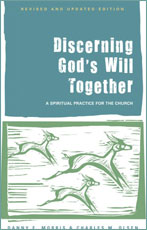"• Discernment requires the intention to be open to the Spirit and (in a group) to each other.
"• Discernment takes time.
"• God is present even in the process of discernment.
"• The process of discernment forms and deepens communal life.
"• Discernment can be surprising; it may not turn out in an expected or predictable way.
"• There is risk in entering the process.
"• Choices are real.
"• There may be more than one right answer.
"• The impact of the discernment process extends into subsequent efforts and other aspects of faith and practice.
"• God uses gifted and wise individuals for the good of all.
"• Adopting the process of discernment moves the culture of the church from win-lose to win-win.
"• The need for coming to indifference cannot be neglected.
"• There is no place for blame in the process of discernment.
"• Confronted with ambiguity, the process goes on.
"• Participants should be open to a change of heart.
"• An ecumenical dimension broadens awareness of the depth of discernment and offers the gifts of each tradition.
"• Growth comes through vulnerability.
"• Trust is both a prerequisite and a result of discernment.
"• History and story need to be recited and appreciated.
"• Freedom to question assumptions is provided.
"• The process involves making and uncovering discoveries.
"• God is active, so the process should be entered with fear and trembling.
"• There are three different levels of discernment:
" • Is this right?
" • Will we obey? follow the Spirit's leading? count the cost?
" • Will we enter into the presence and mystery of God?
"• Discernment leads to involvement with God, with other people, and with the world.
"• Discernment flows from and to insight and wisdom.
"• Being in the process of discernment means listening for God's voice, God's call, God's promise."
